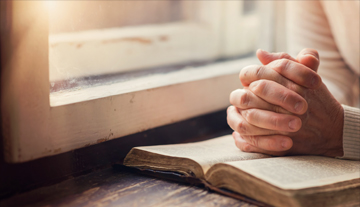Day Four - Morning Devotional
“Will you not revive us again, that your people may rejoice in you?” - Psalm 85:6
Between 1857-1858, one of the great revivals to take place on American soil occurred in the city of New York. Revival soon spread to countless locations throughout the United States. A number of eyewitness accounts of the revival were published. One of the earliest came from the pen of Dr. James W. Alexander, Pastor of the Fifth Avenue Presbyterian Church. A graduate of the College of New Jersey (later Princeton University), Alexander had served his alma mater as a tutor in mathematics and classical languages and subsequently as Professor of Rhetoric and Belles Lettres. Having taught at Princeton Theological Seminary for a brief time, most of Alexander’s public life was spent in pastoral ministry. At the time of the New York revival, Alexander was considered one of the great preachers of the nineteenth century.
Between 1857-1858, one of the great revivals to take place on American soil occurred in the city of New York. Revival soon spread to countless locations throughout the United States. A number of eyewitness accounts of the revival were published. One of the earliest came from the pen of Dr. James W. Alexander, Pastor of the Fifth Avenue Presbyterian Church. A graduate of the College of New Jersey (later Princeton University), Alexander had served his alma mater as a tutor in mathematics and classical languages and subsequently as Professor of Rhetoric and Belles Lettres. Having taught at Princeton Theological Seminary for a brief time, most of Alexander’s public life was spent in pastoral ministry. At the time of the New York revival, Alexander was considered one of the great preachers of the nineteenth century.
In 1859, Alexander published a collection of revival tracts under the title, The Revival and its Lessons. Alexander’s little volume was intended to help ordinary people assess their spiritual state and interest in the work of grace which was taking place in the city.
Alexander provided a brief preface to his work, highlighting key aspects of the phenomenon. As Alexander notes, the revival followed upon what was arguably the worst financial crisis ever experienced in American history. In the summer and fall of 1857, America’s banking industry collapsed, and countless numbers of investors lost their financial assets overnight. “Besides the great number who were utterly ruined, there were ten times as many whose earthly destinies seemed to be in libration. If we were to look no further than to the wear and tear of mind and brain, caused by pecuniary apprehensions and troubles in business, such as drove some to despair and madness, the evil could not be reckoned at the rate of millions of gold and silver.”
In God’s providence, what often hardens men to spiritual realities was used at this time to make them hunger after that which remains and abides. In the present instance, it pleased God, in His marvelous loving-kindness, by the ploughshare of His judgments to furrow the ground for precious seed of salvation, and to make distresses touching worldly estate to awaken desire for durable riches and righteousness. Out of the eater came forth meat and out of the strong came forth sweetness. From the very heart of these trials emerged spiritual yearnings, thirsting, and supplications after the fountain of living waters.
One of the notable characteristics of this revival was a strong emphasis on prayer. Its origins can be found in the consistory room of the North Dutch Church at the Corner of William and Fulton streets; it was here that Jeremiah Lanphier and a few others gathered with a handful of businessmen during the noon hour “to confer, to read the Word, to sing, and to cry unto God for the outpouring of his Holy Spirit.” The numbers in attendance quickly outgrew the facilities and spread across the city.
As Alexander notes, the “great attraction was Prayer.”
“The great business was intercession. This, as springing from the ‘love of the Spirit’ seem especially pleasing to God, who answers us more signally when we seek the good of others. As the meeting went on, solicitude for the conversion of sinners unto God became more apparent. Requests bearing this character were greatly multiplied. From curiosity, from inward anguish, from vague alarm, from the mingled motives in which religious concern has its beginnings, numbers of worldly visitors entered the doors. Conversion after conversion was reported.”
The awakening first began among church-goers, and then quickly spread among non-believers. As the revival spread, the emphasis on prayer remained. “It was eminently, a revival of Prayer. Desires to approach God, jointly, in importunate supplication, were awakened. This was perhaps the leading characteristic. It was repeatedly noticed, that assemblies were more interested in the prayers than the addresses.”
“Never was this so strikingly the case. Never have we known such honor conferred upon God’s ordinance of prayer. And the mode of prayer which prevailed, as has already been hinted, was Intercession. Every relation of life has appeared in tender, touching request. The applications for such intercessory address have been numberless; and if not always seasonable or judicious, they have generally been affecting. They have been transmitted hundreds of miles, and from all parts of the land. May our hearts be equally committed to importunate prayer in seeking a similar outpouring of Divine grace in our time!”
James M. Garretson
Ministry Director at Harvard Law School
Learn more about the 40 Day Initiative >
Resources on prayer and fasting >
See who else has signed up, so you can be encouraged and pray for them >
Learn more about the 40 Day Initiative >
Resources on prayer and fasting >
See who else has signed up, so you can be encouraged and pray for them >





